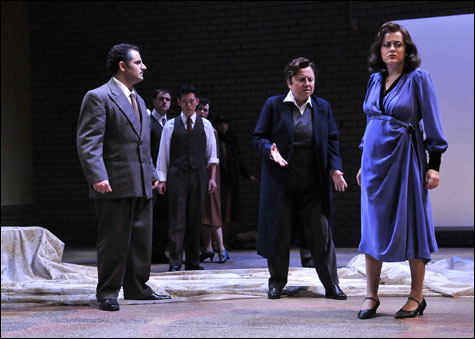
TANCREDI It was Polish coloratura Ewa Podles (center) and Boston soprano Amanda Forsythe (right) who ignited this Rossini rarity. |
By odd coincidence, in recent weeks we’ve had performances of two important operatic rarities, landmark early works a century apart: 30-year-old Handel’s Amadigi (1715) and 20-year-old Rossini’s Tancredi (1813, his 10th opera!). Both were hits, and both have been relatively forgotten. The coincidences don’t stop there. Both take place in the fog of legend (useful for scenic spectacle), and though both were based on previous theatrical works, neither one boasts the dramatic assurance its composer later developed. And both plots spin out interminable complications deriving from the way their heroes (both sung here by women) implausibly and catastrophically question the fidelity of their lovers. Neither Boston Baroque’s semi-staged Amadigi nor Opera Boston’s fully staged Tancredi offered satisfactory solutions, though both featured some outstanding singing.
Amadigi, according to MIT Handel scholar Ellen Harris, was probably a veiled allegory of political intrigue around the court of George I. I wish stage director Paul Peers had found a way to suggest there was more going on than magic and romance. Although he moved his singers into unexpected areas of the stage, and even the Jordan Hall balcony, his “semi-staging” (hints of costume but no scenery and few props) was more minimal — and flatter — than his Handel Xerxes last season. Amadigi needs more help than he provided. Tancredi had the opposite problem. Director Kristine McIntyre situated this essentially unrealistic mediæval romance during the Spanish Civil War, adding nothing but confusion (Who’s on which side? Who are the loyalists and who the fascists?), and so during Rossini’s sparkling, colorful score we were forced to look at the dreary browns, blacks, and grays of Carol Bailey’s set — a massive faux brick back wall (shades of the Met’s grim new Tosca) from which a huge (30-foot?) canvas rag was hanging and something that looked like the side of a pyramid — and ultra-drab costumes.
Amadigi got off to a slow start, but by the second act, the arias and (especially) the duets, all for high voices, began to equal the dazzling orchestrations and accompaniments — the latter including a particularly sumptuous oboe obbligato played by Marc Schachman, an aria with overlapping strings, a kind of bagpipe drone with oboe and bassoon, a magic spell with oboe and trumpet that Handel later used for his famous Water Music. Music director Martin Pearlman kept this all bouncing along. The playing was expert and elegant. And soprano Ava Pine, so touching in the title role of Xerxes, was perfect (in a slinky black sheath) as the villainous sorceress Melissa. Her singing was full yet effortless and beautifully textured. I was also impressed by countertenor Michael White (especially when his voice echoed from the balcony) and the solid soprano Mary Wilson. In the challenging role of Amadigi, mezzo Leah Wool was less convincing, both vocally and dramatically.